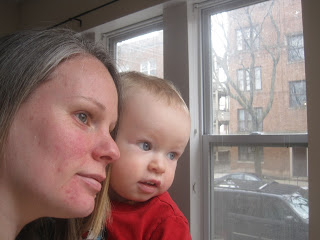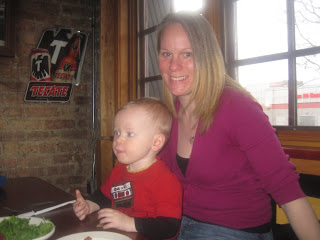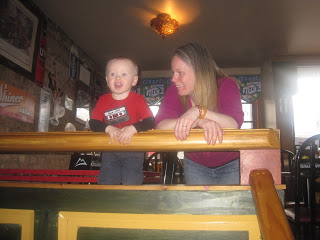 I have gotten a tremendous amount of positive feedback regarding my post from several months back, The Secret of Losing My Shit. I keep recirculating it, but I recently thought to myself, “Why? I have lost my shit like 5,453 times since then so why not just keep talking about this topic?” I consider myself a gentle parent, but that doesn’t mean I am always perfect and always gentle. It means that gentle parenting is my ideal and it is what I strive for. There is not a single person out there who has reached perfection at anything they do. Even professional baseball players who make flawless plays most of the time strike out sometimes.
I have gotten a tremendous amount of positive feedback regarding my post from several months back, The Secret of Losing My Shit. I keep recirculating it, but I recently thought to myself, “Why? I have lost my shit like 5,453 times since then so why not just keep talking about this topic?” I consider myself a gentle parent, but that doesn’t mean I am always perfect and always gentle. It means that gentle parenting is my ideal and it is what I strive for. There is not a single person out there who has reached perfection at anything they do. Even professional baseball players who make flawless plays most of the time strike out sometimes.
I can look back and cringe at some of the things that I have done to Jack. I have yelled at him. I have snapped at him. I have slammed doors in his presence. And that time I punched the door. I am not perfect. I am battling my own shit on a daily basis so that I can be a better mom to him. Better. Not best, not perfect, just better each day.
 I grew up in a loving home free from abuse, but there are many people who endured every type of abuse. These people, like all people, struggle with their own set of issues and obstacles on their road to gentler parenting. Gentle parenting is a process that involves coming to terms with the childhood you endured and trying to break the cycle. One might consider raising their voice completely losing their shit. Someone else might consider spanking losing their shit. It all depends on where we came from.
I grew up in a loving home free from abuse, but there are many people who endured every type of abuse. These people, like all people, struggle with their own set of issues and obstacles on their road to gentler parenting. Gentle parenting is a process that involves coming to terms with the childhood you endured and trying to break the cycle. One might consider raising their voice completely losing their shit. Someone else might consider spanking losing their shit. It all depends on where we came from.
Have you ever heard of ”core beliefs?” These are the basic beliefs that make up how we see ourselves and our relationship with others and the world. These beliefs are developed at a very young age. These are directly related to how we were raised and treated by our primary caregivers. These are underneath the thoughts and feelings that I talk about in The Secret of Losing My Shit. They live deep inside and are not accessed directly. Because they are so long in the making and so deeply ingrained they are inflexible and rigid. It takes serious self-assessment with a mental health professional to really understand our personal core beliefs. There are positive ones such as “I am lovable.” “I am worthy of love.” “I matter.” “I am good enough.” “I am safe in the world.” “I have control.” And there are negative ones such as “I am not good enough.” “I am not lovable.” “I don’t deserve love.” “I am not valuable.” “I am not safe.” “I am powerless.” Our core beliefs direct our thoughts, feelings and behaviors.
 Gentle parenting is a delicate balance between exploring our own early experiences, picking apart what we learned about ourselves from our parents, choosing what we want to keep and what we want to throw out and being as thoughtful and mindful as we can about what we want to pass down to our own children. It is very easy to carry around a core belief that we are not lovable, for example. Gentle parenting is uncovering how we came to believe this or other things about ourselves, taking a hard look at how we were parented (this does not have to involve blaming our parents–they were, after all, trying their best with what they knew) and discovering how to transform our relationship with our own children so that they have a chance at more positive core beliefs about themselves. If this seems like a tall task, well, it is! This shit ain’t easy! This is why there is no such thing as a perfect, gentle-all-the-time parent.
Gentle parenting is a delicate balance between exploring our own early experiences, picking apart what we learned about ourselves from our parents, choosing what we want to keep and what we want to throw out and being as thoughtful and mindful as we can about what we want to pass down to our own children. It is very easy to carry around a core belief that we are not lovable, for example. Gentle parenting is uncovering how we came to believe this or other things about ourselves, taking a hard look at how we were parented (this does not have to involve blaming our parents–they were, after all, trying their best with what they knew) and discovering how to transform our relationship with our own children so that they have a chance at more positive core beliefs about themselves. If this seems like a tall task, well, it is! This shit ain’t easy! This is why there is no such thing as a perfect, gentle-all-the-time parent.
Gentle parenting is not about looking back and beating ourselves up about the ungentle mistakes we have made. It’s about reflection, learning and growing so that we can look to a more connected and gentle future with our children.
When we make mistakes we do not simply say, “Oh well, I screwed up, better luck next time!” No, we look into our children’s eyes. We fully accept the way we made them feel with our actions. We accept the pain and guilt and regret that comes with it. We spend time thinking about how we can avoid this type of situation in the future. We reach out to people for help. We get right in the face of our baby and say, “I’m sorry.” And we damn well mean it.
Abby Theuring, MSW












